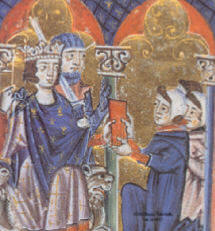The removal of the last Hohenstaufen claimant to the Kingdom of Sicily not
only allowed Charles to tighten his hold on the region, but also permitted
him to pursue another project that he had been developing. Since 1267
Charles had been preparing to launch an expedition against Constantinople
in order to restore the Latin Empire there, which had been lost in 1261.
However, the invasion of Conradin in 1268 had spared the Byzantine Emperor
Michael Palaeologus from Charles's attentions. By 1270 Charles was ready
to try again but now another distraction appeared.
 His brother, Louis IX, was determined to go on crusade again, despite the
previous fiasco in Egypt (1249 - 1252), and asked Charles to support him.
It seems clear that Charles was less than enthusiastic about the venture
but had decided to make the best of the situation. Over the objections of
his councilors, Louis permitted himself to be persuaded by Charles that a
crusade against Tunis was a better alternative than one directed towards
Jerusalem. The Kingdom of Tunis, which had been obligated since 1158 to
pay tribute to the King of Sicily, had used the death of Manfred as an
excuse to stop payments. Charles saw the crusade as an opportunity to
reinstate his authority in Tunis while fulfilling his obligation to go on
crusade with his brother. Even then, Charles did not directly participate
in the fighting until the Christian forces were in complete disarray, and
his presence was demanded. Yet the result was not a decisive victory for
the crusaders, primarily due to the death of Louis IX. The crusade finally
ended in a negotiated peace that, other than paying for the expenses of
the other crusaders, essentially benefited Charles. Among other things it
restored the tribute to Charles and allowed his merchants free access to
Tunis. The treaty was to last ten years but was renewed in 1280. However,
Charles's ambitions in the Maghreb would bring his commercial interests
into conflict with another maritime power in the region. The miniature at
the right depicts Charles of Anjou receiving ambassadors from Tunis (Bibliothèque
Nationale, Paris, France).
His brother, Louis IX, was determined to go on crusade again, despite the
previous fiasco in Egypt (1249 - 1252), and asked Charles to support him.
It seems clear that Charles was less than enthusiastic about the venture
but had decided to make the best of the situation. Over the objections of
his councilors, Louis permitted himself to be persuaded by Charles that a
crusade against Tunis was a better alternative than one directed towards
Jerusalem. The Kingdom of Tunis, which had been obligated since 1158 to
pay tribute to the King of Sicily, had used the death of Manfred as an
excuse to stop payments. Charles saw the crusade as an opportunity to
reinstate his authority in Tunis while fulfilling his obligation to go on
crusade with his brother. Even then, Charles did not directly participate
in the fighting until the Christian forces were in complete disarray, and
his presence was demanded. Yet the result was not a decisive victory for
the crusaders, primarily due to the death of Louis IX. The crusade finally
ended in a negotiated peace that, other than paying for the expenses of
the other crusaders, essentially benefited Charles. Among other things it
restored the tribute to Charles and allowed his merchants free access to
Tunis. The treaty was to last ten years but was renewed in 1280. However,
Charles's ambitions in the Maghreb would bring his commercial interests
into conflict with another maritime power in the region. The miniature at
the right depicts Charles of Anjou receiving ambassadors from Tunis (Bibliothèque
Nationale, Paris, France).


